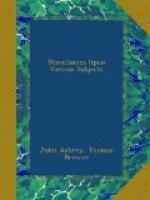* Mr. Baxter’s Certainty of the Worlds of Spirits, p. 137. ** And Radnor.
These {Greek text: Phantasmata} in our language, we call Canhwyllan Cyrph, (i.e.) Corps Candles; and candles we call them, not that we see any thing besides the light; but because that light doth as much resemble a material candle-light as eggs do eggs, saving, that in their journey these candles be “modo apparentes, modo disparentes”, especially, when one comes near them; and if one come in the way against them, unto whom they vanish; but presently appear behind and hold on their course. If it be a little candle pale or bluish, then follows the corps either of an abortive or some infant; if a big one, then the corps of some one come to age: if there be seen two, or three, or more, some big, some small together, then so many and such corpses together. If two candles come from divers places, and be seen to meet, the corpses will the like; if any of these candles are seen to turn, sometimes a little out of the way, or path, that leadeth to the church, the following corps will be forced to turn in that very place, for the avoiding some dirty lane or plash, &c. Now let us fall to evidence. Being about the age of fifteen, dwelling at Lanylar, late at night, some neighbour saw one of these candles hovering up and down along the river bank, until they were weary in beholding it, at last they left it so, and went to bed. A few weeks after came a proper damsel from Montgomeryshire, to see her friends, who dwelt on the other side of that river Istwith, and thought to ford the river at that very place where the light was seen; being dissuaded by some lookers on (some it is most likely of those that saw the light) to adventure on the water, which was high by reason of a flood: she walked up and down along the river bank, even where, and even as the aforesaid candle did, waiting for the falling of the water; which at last she took, but too soon for her, for she was drowned therein. Of late my sexton’s wife, an aged understanding woman, saw from her bed, a little bluish candle on her tables-end; within two or three days after, came a fellow enquiring for her husband, and taking something from under his cloak, claped it down upon the tables-end; it was a dead born child.
Another time, the same woman saw such another candle upon the end of the self same table; within a few days after a weak child newly christened by me, was brought to the sexton’s house, where presently he died: and when the sexton’s wife, who was then abroad, came home, she found the child on the other end of the table, where she had seen the candle.
Some thirty or forty years since, my wife’s sister, being nurse to Baronet Rudd’s three eldest children, and (the Lady mistress being dead) the Lady comptroller of the house going late into the chamber where the maid servants lay, saw no less than five of these lights together. It happened a while after, that the chamber being newly plaistered, and a grate of coal fire therein kindled to hasten the drying of the plaister, that five of the maid servants went to bed as they were wont (but as it fell out) too soon; for in the morning they were all dead, being suffocated in their sleep with the steam of the new tempered lime and coal. This was at Langathen in Carmarthenshire. —– Jo. Davis. See more.—–




